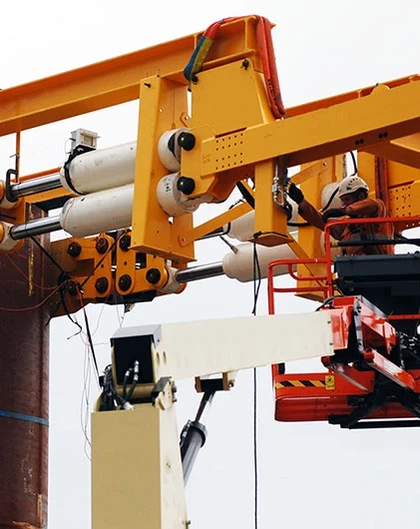Materials testing with the light weight deflectometer to ensure the longevity of road surfaces. Measure bearing capacity in subgrades, granular layers and backfilling materials.
The Light-Weight Deflectometer (LWD) is a light weight portable tool used for measuring the bearing capacity (deflection) of subgrade/subsoils and unbound base layers, granular layers and backfilling materials. The zone of influence for the test typically extends to between 1 and 1.5 times the plate diameter.
The apparatus comprises of:
- A loading plate (300mm) capable of approximately uniform distribution of the impulse load
- A load cell, used to measure the applied load of each impact to a precision of 0.1kN
- A deflection sensor, capable of measuring the maximum vertical movement
- A 10kg drop weight, capable of being raised to variable height
- A data capture system
The device gives an indication of deformation, bearing capacity and compaction, and can calculate a surface modulus (MPa) value based on the force required to generate a given deflection (mm) for that soil type. Surface modulus is the most accurate and independent means for judging deformation (stiffness) and, thus, a material’s level of compaction.
By understanding the pulse shape/pattern along with site observations from each test, the LWD can provide an indication of poor compaction and/if excessive water is present within the material.
A CBR (California Bearing Ratio) value can be calculated using the mean surface modulus.
Based on the static plate load test requiring a load vehicle, the LWD provides a simple, fast and repeatable test providing an accurate assessment of compaction parameters and along with its integrated GPS interface it records the coordinates of each test location.
The benefits using the portable device include:
- No requirement for kentledge so it’s not tying up any plant
- Lightweight and portable meaning we can test in small spaces where a traditional static plate test is impossible
- Rapid assessment
- GPS interfaced test locations
- Light weight and portable
- Can test on a range of material types including: treated soils, stabilised soils, unbound mixtures, hydraulically bound mixtures and cold recycled mixtures which contain bitumen.

Talk to our experts
Want to find out more about SOCOTEC's Construction Materials Testing Services?
You might also be interested in:










